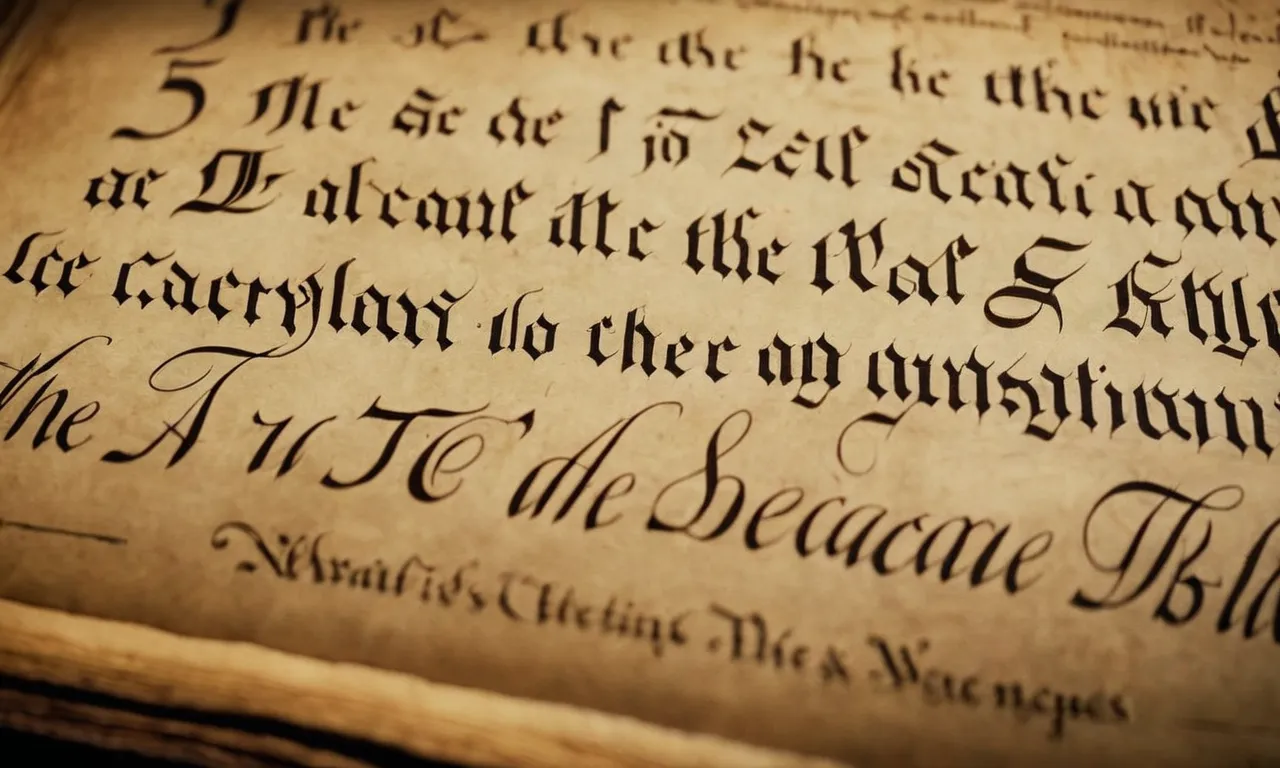Who Were The 7 Deacons In The Bible?
The early church faced challenges meeting the needs of its growing community. To address this, the apostles appointed seven faithful men to serve the church in a special capacity – these were the first deacons.
If you’re short on time, here’s a quick answer: The 7 deacons in the Bible were Stephen, Philip, Prochorus, Nicanor, Timon, Parmenas, and Nicolas of Antioch. The early church chose them to help distribute food and provide aid to those in need.
In this comprehensive article, we will look closely at the biblical background of these 7 deacons, examining the key Scripture passages that discuss their selection and service.
We’ll learn about the qualifications and duties required of deacons and see how the first deacons fulfilled a vital role in allowing the apostles to devote themselves to prayer and preaching.
Background on the Selection of the 7 Deacons
The Early Church and the Need for Aid
In the early days of the Christian church, the number of believers and followers of Jesus grew rapidly. As recorded in Acts 2:41, over 3,000 people were baptized and added to the church on the day of Pentecost alone. As the good news of Jesus Christ spread, the church continued to expand.
However, with growth came certain logistical challenges. One major need was to provide aid and food to Hebrew widows among the early believers (Acts 6:1).
It seems that some widows were being overlooked or neglected in the daily distribution of food and charity. This was not done intentionally but was simply a byproduct of the vast growth of believers.
Debate Over the Daily Distribution (Acts 6:1-7)
The twelve apostles were devoted to preaching, teaching, and prayer. But the pressing physical needs of the community began to distract them from their spiritual calling.
Acts 6:2 notes that It would not be right for us to neglect the ministry of the word of God in order to wait on tables.
So the twelve apostles gathered together the wider community of believers. Their solution was to appoint seven men “full of the Spirit and wisdom” to handle the responsibility of ensuring the equitable daily distribution to Hebrew widows.
This allowed the apostles to remain devoted to prayer and ministry of the word (Acts 6:4).
Qualifications for the First Deacons
The qualifications for the first deacons centered on being men “full of the Spirit and wisdom” (Acts 6:3).
They were likely leaders already emerging within the early church community.
While not much background is provided, we know they had Greek names, implying they were most likely Hellenistic Jews.
In his first letter to Timothy, the apostle Paul would later outline qualifications for deacons (1 Timothy 3:8-12). These included being dignified, not hypocritical, refraining from heavy drinking, and being tested before serving.
So biblical qualifications evolved but centered on personal maturity and leadership capability.

Profile of Each of the 7 Deacons
Stephen
Stephen was one of the first seven deacons appointed by the apostles to serve the early church in Jerusalem (Acts 6:5).
He was “a man full of faith and of the Holy Spirit” (Acts 6:5) and was also said to be full of grace and power, performing great wonders and signs among the people (Acts 6:8).
As Christianity began to spread, opposition arose against Stephen and he was eventually stoned to death outside Jerusalem after boldly preaching the gospel and accusing the Jewish leaders of resisting the Holy Spirit (Acts 7:51-60). Stephen became the first Christian martyr.
Philip
Philip was another of the first seven deacons chosen to serve the church in Jerusalem (Acts 6:5). After opposition arose against the church and believers scattered, Philip went to Samaria and powerfully proclaimed Christ there, performing signs and miracles, leading many Samaritans to believe in Jesus (Acts 8:5-13).
An angel of the Lord then directed Philip to go down to the desert road from Jerusalem to Gaza, where he encountered and shared the gospel with an Ethiopian eunuch traveling back home from worshiping in Jerusalem (Acts 8:26-40).
Philip continued preaching the gospel in all the towns until he reached Caesarea (Acts 8:40).
Prochorus
Prochorus was also one of the first seven deacons commissioned to serve the church in Jerusalem (Acts 6:5).
According to tradition, he accompanied the apostle John as an assistant and secretary, recording much of the content that John dictated in the Book of Revelation.
Later stories indicate that Prochorus went with the Apostle Peter from Jerusalem to Antioch, and traveled with the Apostle John to serve the churches in Asia Minor. He is believed to have been martyred in Antioch.
Nicanor
Nicanor was another of the first seven deacons appointed to aid the apostles by serving the church in Jerusalem (Acts 6:5). Little else is known about him directly from Scripture.
However, according to some early church traditions, Nicanor was one of the seventy disciples sent out by Jesus (Luke 10:1), and he spread the gospel in Cyprus and in Judea with the apostles Peter and Paul after Pentecost.
He is said to have been martyred in Jerusalem.
Timon
Timon was also among the first seven men chosen as deacons to serve the church in Jerusalem (Acts 6:5). Aside from being listed among these first deacons, nothing more is known about Timon from Scripture.
According to later traditions, after serving in Jerusalem, Timon joined the apostle Paul in his missionary travels and was eventually appointed as the first bishop of Bostra in Arabia.
It is believed he was stoned to death after boldly preaching the gospel in Greece.
Parmenas
Parmenas was another of the initial seven deacons commissioned to aid the apostles by serving tables and providing material support for the church in Jerusalem (Acts 6:5).
Other than being included in this list of first deacons, nothing more is known about Parmenas from the biblical account.
According to church tradition, he was one of the seventy disciples sent out by Jesus during his earthly ministry (Luke 10:1). After Pentecost, Parmenas continued his ministry in Jerusalem but was eventually martyred for his faith.
Nicolas
Nicolas was the last of the initial seven deacons chosen to serve the church in Jerusalem (Acts 6:5). Some later traditions suggest Nicolas became an apostate after being commissioned as a deacon, reverting to paganism and immorality.
However, many scholars believe such traditions confuse Nicolas with a separate man by the same name who founded the Nicolaitans, a heretical sect condemned in Revelation 2:6 and 2:15.
According to other accounts, Nicolas preached the gospel in North Africa and was later martyred in Myra.
The Ministry and Legacy of the First Deacons
Distribution of Food and Resources
The first deacons were appointed to help distribute food and resources fairly among the early Christians, especially the Greek-speaking widows who were being overlooked (Acts 6:1-6). This allowed the apostles to focus on preaching and teaching while the deacons handled the charitable work.
Their ministry set a precedent for deacons serving the practical needs of the church.
The deacons brought order and efficiency to the distribution of resources.
They prevented marginalized groups from being neglected and ensured the equitable sharing of food, money, and other necessities.
Their logistical support freed the apostles to devote themselves to prayer and ministry of the word (Acts 6:4).
Pioneers of Service and Leadership
Stephen and Philip, two of the first seven deacons, emerged as compelling preachers and evangelists in their own right.
Stephen powerfully proclaimed the gospel before the Sanhedrin, while Philip helped spread the faith to Samaria and to an Ethiopian eunuch (Acts 6:8-8:40).
Their courageous leadership blazed a trail for future generations of deacons.
In addition to charitable service, deacons like Stephen and Philip modeled fearless proclamation of Christ. They refused to limit themselves to mundane tasks but became dynamic agents of gospel expansion.
Later deacons such as Phoebe (Romans 16:1) and Erastus (Acts 19:22) also emerged as influential leaders in the early church.
Launching Pad for Evangelism and Church Growth
The ministry of the first deacons facilitated gospel advancement. As the apostles focused on teaching and preaching, deacons like Stephen confronted false charges against Christianity and fearlessly spread the faith.
Philip’s evangelistic travels resulted in many conversions, including Simon the sorcerer (Acts 8:9-13). The deacons’ logistical service and bold witness aided church growth in Jerusalem (Acts 6:7).
By meeting physical needs and proclaiming Christ, they removed obstacles to the gospel and enabled the message to multiply. As the church expanded, deacons continued to fill crucial servant-leadership roles.
Conclusion
The selection of the first 7 deacons marked an important development in the leadership structure of the early church.
Confronted with the very practical challenge of caring for widows, the apostles responded by appointing Spirit-filled men to oversee this responsibility.
While fulfilling their duty to distribute food, the deacons Stephen and Philip quickly moved on to preaching the gospel with power. The foundation of service they helped establish spilled over into greater ministry impact, both in Jerusalem and beyond.








